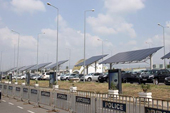
Solar power system at Tbilisi International Airport
By Mariam Chanishvili
Monday, August 1
A solar energy generation system was launched at Tbilisi Shota Rustaveli International Airport with support of the Japan International Cooperation Agency (JICA).
Tbilisi International Airport is the first facility to use solar energy in the region.
The goal of the project is to introduce the concept of clean energy consumption in Georgia. The project was initiated by the Government of Japan, and carried out in Georgia in cooperation with the Ministry of Economy of Georgia, TAV Georgia and United Airports of Georgia.
The aim is to promote and develop the usage of this type of energy in Georgia, which will reduce the emissions of CO2 (CO2 emission will be reduced by 187 tons each year).
Solar power is one of the cleanest and most reliable forms of renewable energy. The generated electricity will be used for lighting the airport terminals.
The project was also seen as important in order to have an uninterruptible power supply in extreme conditions and to save electricity-related costs.
JICA is the primary Japanese governmental agency responsible for technical cooperation that granted 480,000,000 yen (approx. 4,500,000 US dollars) to the government of Georgia in order to implement the project. The grantees of the project selected are the United Airports of Georgia, under the auspices of the Ministry of Economy and Sustainable Development and Ilia State University.
Japanese specialists in the management and operation trained staff from Ilia State University and the airport for the proper functioning of the system.
The Presentation of the project of Solar Energy Consumption was attended by the Mayor of Tbilisi, David Narmania, H.E. Mr. Toshio Kaitani Ambassador Extraordinary and Plenipotentiary of Japan to Georgia, Director of United Airports of Georgia, Ketevan Aleksidze, Managements of TAV Georgia and United Airports of Georgia, etc.
The construction process was carried out by a Japanese company, the Itochu Corporation, with support of Fuji Furukawa Engineering Construction Co.Ltd. and Grusia, Ltd. The construction process of the solar system took 7 months.


